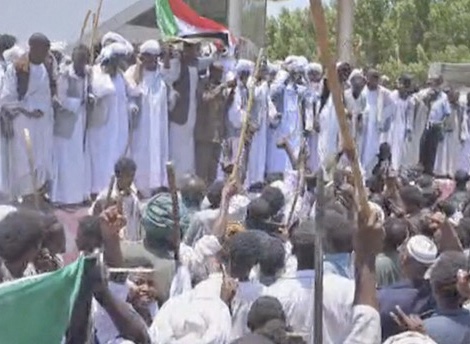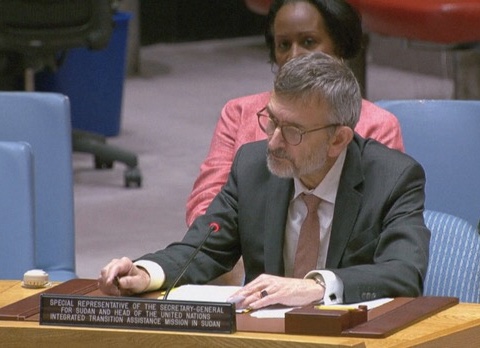A letter has been sent to the US State Department and the Secretary General of the United Nations, demanding that the US Envoy, ‘Special Representative of the Secretary General (SRSG)’ – Volker Perthes, be immediately removed from his post for ‘being partisan’ in his mediation efforts both prior to and during the conflict which has beset Sudan since April 15th.
Senior sources within General Burhan’s inner circle, have leaked details of the letter, which apparently accuses Perthes of attempting to engineer developments in Sudan and suggesting that he was actually culpable in inflaming the tensions which eventually led to the current conflict. The accusations of his ‘interference’ apparently go back to the early stages of the transition programme and continued through the process leading up to a breakdown in the governing administration and the outbreak of hostilities.
UNITAMS no longer regarded as a just and transparent mission
The letter held that the: ‘transparent and just functioning of UNITAMS has been lost, due to the performance and personal disposition of the head of the mission and mediators from outside the mission’ and it referred to ‘the strange behaviour’ of Perthes during the transitional period and the way that he responded to the political developments in Sudan since his first arrival in February 2021. It goes on to make clear that the UN has no choice but to comply with the request for Perthes to be replaced on the basis that Sudan reserves the right within the UN Charter chapter 1, paragraphs 2 to 7, which establishes that the United Nations must not exercise ‘powers and interventions in matters considered to be within the jurisdiction of the national judicial and legislative authorities of member states’.

UN Secretary General ‘shocked’ to receive letter
A spokesperson from the office of the UN Secretary General said that he was ‘shocked’ by the letter and declared that the UN Secretary General, Antonio Guterres, retained continued and complete confidence in the work of Volker Perthes. A statement published by the US Department of State on Sunday 27th May, declared that:
‘The United States underscores our strong support for the United Nations and the ongoing work of Special Representative of the Secretary General (SRSG) Volker Perthes, in leading the UN Integrated Transition Assistance Mission in Sudan (UNITAMS). We express our concern over the letter from the Sudanese Armed Forces calling for his resignation. SRSG, Perthes, continues to have our confidence in implementing the UNITAMS mandate and in supporting the Sudanese people to achieve a peaceful and democratic future.’
The current UNITAMS term of engagement in the region is due to elapse at the beginning of June and it is anticipated that to avoid confrontation, Perthes will be discreetly replaced by another envoy.
Short-term ceasefire’s limited success urges calls for an extension
The commotion over the UN envoy took place as the latest 7-day ‘Short-Term’ humanitarian ceasefire, which came into force on 22nd May at 9.45pm, entered its final days. The ceasefire, although described as ‘imperfect’, has allowed some international aid groups, such as the World Food Programme to successfully deliver desperately needed supplies into key areas of Khartoum and other parts of the country including Darfur.
Half of Sudan’s population is in need of humanitarian assistance
According to UN officials, more than half of Sudan’s population is currently in need of humanitarian assistance. Humanitarian workers on the ground have reported that the delivery of aid continues to be hampered by ongoing fighting, but they say there has been a notable downward shift in the levels of fighting in heavily populated areas, although there were reports of continued sexual violence. The state run organisation, ‘Combatting Violence Against Women Unit’ reported as many as 24 cases of sexual assault in Khartoum and 35 similar cases in Darfur mostly they said, committed by RSF rebel Forces and not the Sudan State Army.
Unique independent monitoring allows policing of humanitarian corridor
The ceasefire mandate differed from earlier agreements, in that uniquely it included for the first time, a provision to include a monitoring mechanism which not only included representatives of the State Armed Forces and the RSF – the two fighting parties, but also representatives from Saudi Arabia and the US, who were the brokering parties to the agreement, following talks in Jeddah.
A statement issued by the ‘joint facilitators’, just two days into the implementation of the agreement, underlined the significance of this mechanism:
‘In their capacity as facilitators, the Kingdom of Saudi Arabia and the United States of America noted improved respect for the Agreement on a Short-Term Ceasefire and Humanitarian Arrangements in Sudan on May 25. Although there was observed use of military aircraft and isolated gunfire in Khartoum, the situation improved from May 24 when the ceasefire monitoring mechanism detected significant breaches of the Agreement. Those included observed use of artillery and military aircraft and drones, credible reports of airstrikes, sustained fighting in the heart of the Khartoum Industrial Area, and clashes in Zalingei, Darfur.’
The Sudan Armed Forces have continued to maintain that they have had limited choices but to respond when the Rebel RSF forces failed to adhere to the terms of the agreement. This included the moving and reinforcing of troops, consistent looting of shops and the homes of non-combatant civilians.
The joint facilitators statement further pointed out that resurgent fighting continued to endanger civilians, to obstructed humanitarian assistance, and that this was ‘undercutting the ceasefire’s principal aims’. It noted that in response to a caution issued to both sides of the conflict to prevent further violations, there had been a notable improvement in respect of the terms of May 25th ceasefire.
Despite the imperfect nature of the ceasefire, there have been calls once it ends on Monday, for it to be extended. The joint US and Saudi initiative, which brokered the original ceasefire, issued the following statement two days later on Saturday 27th May:
‘As facilitators of the Agreement on a Short-Term Ceasefire and Humanitarian Arrangements, the Kingdom of Saudi Arabia and the United States of America call on the Sudanese Armed Forces and the Rapid Support Forces to continue discussions to reach agreement on extending the ceasefire that is set to expire at 9:45 pm Khartoum time May 29. While imperfect, an extension nonetheless will facilitate the delivery of urgently needed humanitarian assistance to the Sudanese people. In the absence of an agreement to extend the current ceasefire, it remains incumbent on the parties to adhere to their obligations under the short-term ceasefire and the preceding Declaration of Commitment to Protect the Civilians of Sudan.’
Sudan Armed Forces calls up reserve servicemen to bolster offensive
The announcement on Friday 26th May, by the State’s Defence Ministry and General Burhan, was it said, in response to the RSF’s ‘disrupting public life by targeting of service centres (water, electricity, hospitals) and the state’s infrastructure, looting banks and burning markets, airports and ministries, and creating chaos by liberating prisoners and occupying police stations and the headquarters of the General Intelligence Service.
The Ministry of Defence decided it necessary to ask on a voluntary basis, all reservist servicemen – retired army officers and reserve soldiers of the Sudan Armed Forces (SAF), to present themselves at their nearest military base. The apparent mobilisation was a response the announcement argued, with:
‘[the RSF]targeting of honourable and innocent citizens and using them as human shields, the theft of their property and the occupation of their homes, in addition to intimidation and humiliation…In support of the great military effort made by the SAF in order to restore security and stability, it has been decided to call in full for all officers, non-commissioned officers, and pensioners of the Armed Forces.’ The Ministry has rejected suggestions that this represents ‘a call to arms’ and has said that the arming of former servicemen and officers is intended to prevent attempts by the rebel forces to occupy the homes of civilians, to challenge attempts at looting and the destruction of government property.
The governor of North Darfur has called upon civilians to arm themselves to protect against attacks from the RSF following reports that significant numbers of civilians have been killed, markets attacked and burned, health and government institutions vandalised. He said as head of an armed group, that with the help of civilians arming themselves and with the support of his forces, they would be able to repel any further attacks from the rebel forces.


















